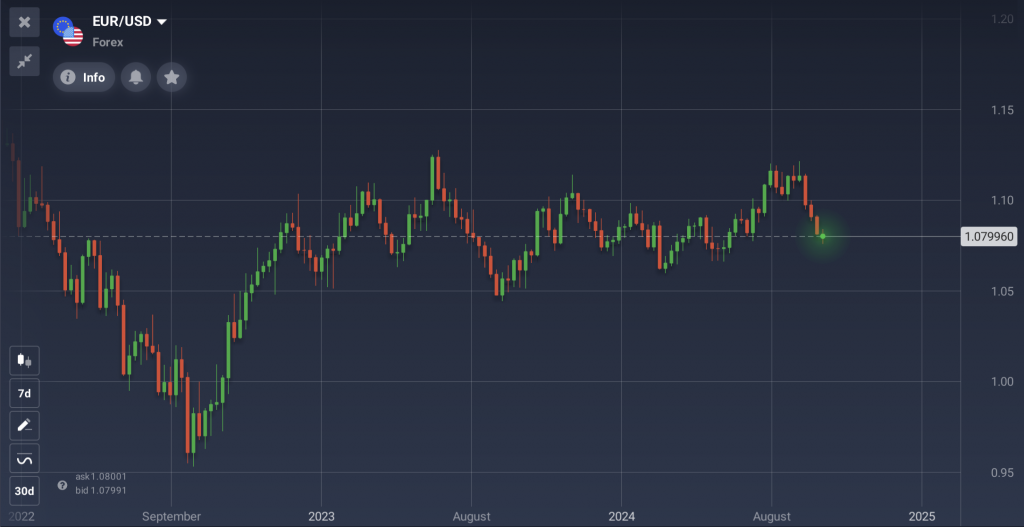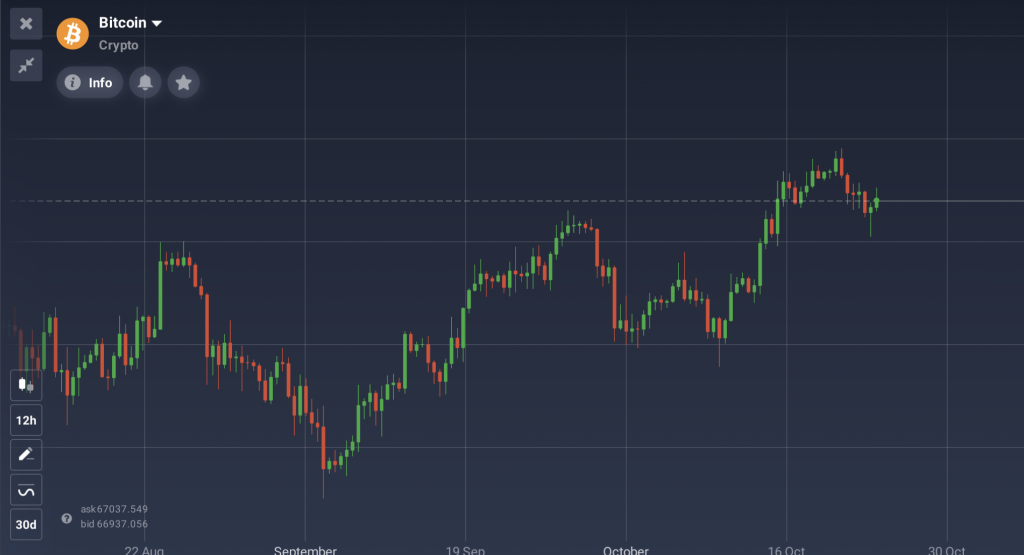The U.S. presidential election is not just a political event — it’s a critical moment that sends shockwaves across global financial markets. Given the strong ties between global markets and the American economy, it’s difficult to overestimate the US election impact on markets, as well as economic policies, investment trends, and international trade.
With the USD acting as the world’s primary reserve currency, any changes in political leadership can trigger shifts in market sentiment and lead to increased volatility. In this article, you will discover how the election may influence key assets like forex, oil, gold, stocks, and even the crypto markets.
What do we know so far?
- The 2024 U.S. presidential race is highly competitive, with no clear frontrunner, adding to market uncertainty.
- As of the final weeks of the campaign, polls show a close race between Democratic nominee Vice President Kamala Harris and Republican nominee, former President Donald Trump.
- Both national and battleground state polls reflect a neck-and-neck contest, making it difficult to predict who will emerge victorious.
This means that traders should prepare for any outcome and consider the potential impact on their assets. Let’s find out what to expect and which assets may be most affected by the results of this election.
How will the market react to the election results?
While every election is different, and the economic and political conditions constantly change, some analysts tend to highlight common patterns in market reaction to this event. It may be a good idea to consider them when forming your trading strategy around the election.
Market volatility
Historically, the months leading up to a U.S. presidential election have been marked by heightened market volatility. As uncertainty lingers, markets fluctuate in response to changing expectations and speculation about the future. However, this turbulence typically decreases once the election results are confirmed, providing clarity and reducing some of the anxiety that had fuelled volatility.
Return to stability post-election
After the election, markets often experience a sense of relief, especially in the realm of U.S. large-cap stocks. Historically, this sector has seen a noticeable rebound as investor confidence is restored. This early optimism is largely fuelled by the market’s anticipation of new economic policies, such as tax reforms.
However, it’s important to remember that the transition from campaign promises to actual policy implementation may take some time. Still, as election-related uncertainty fades, markets often enter a more stable phase, with U.S. assets typically benefiting from the renewed focus on economic growth.
US election impact on markets: forex, stocks, commodities, crypto
The outcome of the November U.S. election could have a profound effect on several key financial markets. The two leading candidates present very different views on both domestic and international policies. From immigration and trade tariffs to government spending and taxes, these policy contrasts could lead to significant shifts in market behaviour.
In this section, we’ll explore how the election could influence specific markets, including stocks, commodities, forex, and cryptocurrencies, as traders prepare for potential changes.
Forex
The outcome of the U.S. presidential election will have a significant impact on the forex market, particularly in relation to the USD. The incoming administration will shape trade and fiscal policies, which, in turn, influence economic growth, inflation, and the value of the dollar.
Trump: tax cuts and tighter immigration
Some analysts suggest that a Trump victory could be bullish for the dollar. Trump’s proposed tax reforms and tighter immigration policies are expected to stimulate economic growth and contribute to inflationary pressures. While tax cuts would encourage spending and economic activity, stricter immigration controls could create labour shortages, potentially driving wages higher.
Additionally, Trump’s tendency to implement trade tariffs would likely hurt European exports and support a stronger U.S. dollar by pushing up domestic inflation due to higher import costs. In short, this could lead to a stronger USD due to looser fiscal policy and increased inflation.
Harris: support for international trade
In contrast, a Kamala Harris victory would result in fewer tax cuts. This fiscal restraint could slow economic growth and curb inflationary pressures compared to a Trump-led administration. Harris is also expected to adopt a more cooperative trade policy, easing the risks of tariff-induced disruptions. A more stable trade environment could benefit currencies like the euro, as Harris would likely avoid the trade conflicts that have pressured the EUR/USD in the past. This outcome could be positive for the EUR, but not necessarily beneficial for the USD.

Overall, the election’s outcome will set the tone for the USD’s direction, but other factors — like the Federal Reserve’s policy decisions and broader geopolitical dynamics — will also play a crucial role in shaping currency movements in the months ahead.
Stocks
When it comes to U.S. stocks, the presidential winner could have a major influence on which sectors thrive.
Trump: a boost for oil production and higher tariffs
If Donald Trump returns to the White House, he would likely continue to support traditional industries such as oil and defence. Companies involved in fossil fuels and defence contracting would be well-positioned to benefit, much as they did during his first term.
When it comes to foreign policy, Trump’s protectionist approach with trade barriers and tariffs could once again lead to tensions with major economies like China and the European Union. This could stir up volatility, especially in emerging markets that are more vulnerable to global trade disruptions. In that case, foreign companies may find it harder to enter the US market and attract American consumers, potentially affecting their stock value.
Harris: focus on renewable energy and trade-friendly foreign policy
In contrast, a victory for Kamala Harris would signal a shift towards renewable energy and electric vehicles, aligning with her progressive stance on environmental issues. Companies like Tesla, SolarEdge and others could see a boost as clean energy initiatives take centre stage under policies that echo the Green New Deal.
Harris is also expected to pursue a more cooperative and trade-friendly foreign policy. Her approach could reduce geopolitical risks, stabilize supply chains, and benefit multinational corporations with global operations.
Commodities
When it comes to commodities, the results of the U.S. presidential election could lead to very different paths for energy markets.
Trump: a push for domestic energy production
A Republican victory would likely favour the expansion of fossil fuel production, particularly oil and natural gas. By removing climate restrictions and encouraging domestic energy production, Donald Trump could push energy costs down in the short term. This could benefit industries reliant on lower operational costs and stabilize certain commodity markets, excluding precious metals like gold.
Harris: support for green energy
On the other side, Kamala Harris is expected to promote a green energy agenda, though her exact approach to climate policy has remained unclear. A Harris victory would likely further accelerate the transition to renewable energy, which could result in tighter oil and gas supplies. This supply constraint may, over time, become a driver of inflation, pushing up the value of the USD. Commodities, such as crude oil and gas, could experience increased volatility under such conditions.
In either scenario, the commodities market will react to both the immediate and longer-term consequences of energy policies. This makes it essential for traders to monitor not only political developments but also the broader macroeconomic indicators.
Crypto
The U.S. presidential election could have a notable impact on the cryptocurrency market, particularly in terms of regulation and the broader adoption of digital assets.
Trump: speaks out in favour of crypto
Trump has been outspoken in his support for cryptocurrencies, even pledging at the Bitcoin 2024 conference to make the U.S. the “crypto capital of the planet” and position Bitcoin as a global financial superpower. However, while Trump has gained popularity among crypto enthusiasts, there are no specific policy details justifying Bitcoin’s recent rally, suggesting that much of the excitement is speculative.

Trump’s tariff policies, however, could pose a risk to the crypto market by increasing inflation. Higher inflation could lead to increased market volatility, which may weigh on Bitcoin and other digital assets. Additionally, trade conflicts and economic uncertainty could push investors toward safer assets.
Harris: suggests more regulation and clarity for the crypto sector
On the other hand, Kamala Harris has proposed a more structured approach to regulating cryptocurrencies. While this would likely introduce more oversight, it could also offer more clarity and stabilize the market in the long term.
In conclusion, while the U.S. presidential election will undoubtedly influence the financial markets, traders should remember that broader economic trends and inflationary pressures often have a more lasting impact on market performance than election outcomes alone. From stocks and commodities to forex and cryptocurrencies, the policies of the incoming administration will shape key sectors. However, factors like global trade, fiscal policy, and Federal Reserve decisions will play an equally important role.
This election presents a unique set of opportunities, with potential volatility across various markets, making it an exciting time for traders. Whether you’re eyeing shifts in energy, tech, or crypto, the election season offers numerous chances to capitalize on market movements. Don’t miss the opportunity to leverage these developments and position yourself for potential gains in this dynamic trading environment.

